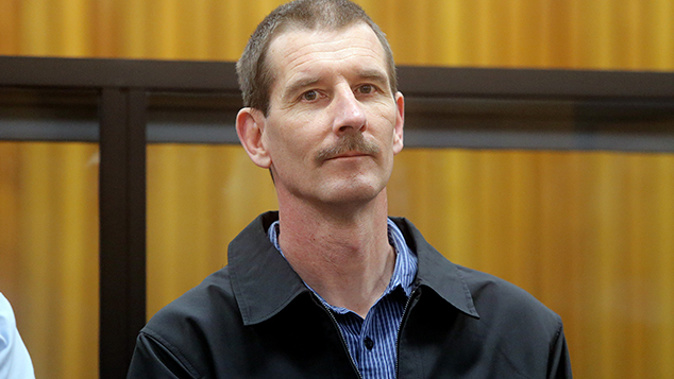
UPDATED 1.51pm: A Taranaki man convicted of murdering his own son has been sentenced to life imprisonment.
David Roigard won’t be eligible for parole for 19 years after murdering his son Aaron and hiding his body in June 2014.
He killed his son when he could no longer conceal that he had stolen over 66-thousand dollars from him between 2007 and 2014. David Roigard continues to deny the murder.
Roigard was also found guilty of eight charges of theft in a special relationship.
Today in court Aaron’s partner Julie Thoms read a victim impact statement which described how she feels lost, confused and angry since Aaron’s murder, adding she has lost the ability to trust people.
She says she has trouble explaining to her two sons what happened to their Dad.
Ms Thoms said “I wish that we could have Aaron’s body back to say goodbye, and get some closure.”
“Without this I am unsure how to fully move on with my life.”
Aaron’s best friend Andrew Wright re-iterated those thoughts outside of the court.
“All friends and family of this whole situation, we won’t be really truly resolved on the situation, until we have our friend Aaron Roigard back, so we can put him to rest.”
Police have yet to give-up on finding Aaron’s body.
Detective Senior Sergeant Blair Burnett this afternoon confirmed police had made another approach to David Roigard for information to locate Aaron’s body. But Roigard refused to co-operate.
Detective Burnett says “At this point in time there’s nothing further to search, but in light of any credible information we’ll reconsider and we’ll carry on.”
“As time goes by to be honest I’ve become less and less positive [in finding Aaron’s body],”
“It’s more and more difficult in the passage of time to find somebody.”
Last year’s five-week trial focussed on that theft of 66-thousand dollars.
Bank records produce in court showed up to seven hundred dollars a fortnight was transferred.
Witnesses during the trial, including his partner and the mother of his two children Julie Thoms, said Aaron told them the money was being invested through his father so he could save for a farm.
However, Crown Prosecutor Cherie Clarke said “Every single penny was being used by the defendant for his own selfish purposes.”
David Roigard has never denied receiving the money, or even spending it.
The defence instead argued Aaron always knew he was spending it, and he was ok with it.
In an interview with police shortly after Aaron disappeared, David Roigard said he always paid for Aaron’s car registrations and oil changes, and even a few out of town trips. However, he admitted the arrangement worked in his favour.
During the interview Roigard appeared shocked when told by police the total sum Aaron had given him totalled over $60,000.
The crown case while strongly focussing on the motive, also focussed on other details such as internet searches and cell phone recordings.
Ms Clarke says one of the most important holes in David Roigard’s story was two phone calls made around the time Aaron disappeared. The two phone calls from Roigard’s phone, channelled through a cell phone tower unreachable from his Waiteika road home, where Aaron was last seen, meaning he was somewhere else at the time these calls were made.
The crown argued Roigard left the property at this time to bury Aaron’s body somewhere up Eltham road or Hastings road. She also told the jury the murder was pre-meditated, and spoke of internet searches David Roigard had made in the months leading up to Aaron’s disappearance, which included ‘Why can someone die from one blow to the head’ and chainsaw massacres.
Defence Lawyer Paul Keegan argued throughout the trial, that without a body ever being found it was impossible to prove beyond reasonable doubt that Aaron was dead. He said they have no way of knowing the injuries Aaron may have received, or the cause of death.
Mr Keegan also told the jury not to rule out suicide, and referred to how witnesses had spoken of how Aaron had suicidal thoughts when he was a teenager.
He also argued that despite witnesses saying Aaron was happier than he had ever been the day he went missing, they could not discount David Roigard had finally informed Aaron that day, that there was no money and no farm. He says this would have crushed Aaron’s dream and could potentially have driven him into depression.
However, the jury of nine women and two men found David Roigard guilty of the murder, and Justice Paul Heath convicted him of the charges.
Take your Radio, Podcasts and Music with you









